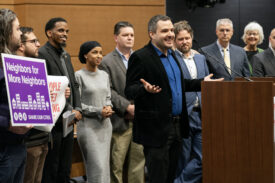Some snippets from an opinion survey of Puget Sound residents, conducted last year by Washington’s transportation department, yield a bit of a conundrum:
- When asked whether there’s "enough", "not enough", or "too much" money going into the state’s general -purpose roads and highways, 51 percent of respondents say "not enough," and only 9 percent say "too much." That is, the majority of respondents want to spend more money on roads.
- When asked the same question about transit, 45 percent say "not enough" and 16 percent say "too much."
Comparing transit and roads, the figures are fairly close—but still, it seems that survey respondents think that road spending deserves a boost more than transit does.
But…the very next question in the survey asks respondents to choose between two statements:
- "We’ve got enough roads and highways. We need to expand our transit system with more buses, light rail, and other transportation choices to give commuters choices for their commute."
- "We’ve got plenty of transit. We need to maintain the roads we have, expand existing roads and highways, and build new roads to make faster connections for people in our region."
The result—51 percent of survey respondents in the Puget Sound agreed with the former statement; 38 percent with the latter. That is, survey respondents support new transit over new roads, and by a fairly wide margin.
What gives? How can public opinion tilt towards more funding for roads, when a majority believe we already have enough?
Rather than simply saying that the public is confused on the matter, a deeper dive into the survey results sheds some light. When asked about specific funding priorities, respondents preferred to devote more money to maintaining and fixing the existing roads than on building new ones. So the apparent preference for road spending, in all likelihood, largely reflects an overall desire for smoother and safer roads, not more of them. Which makes sense: new roads almost always go at the urban fringe, since most other places already have a road network—which means that only a few residents see much actual benefit from shiny new highways.
What’s less clear to me is how survey respondents would have thought about road widening projects. Does, say, adding lanes to I-405 on the east side of the Puget Sound region count as new highway spending (because it adds to capacity)? Highway maintenance (because it’s not creating a whole new road, just widening an existing one)? Or transit (because if current plans go forward, buses will be one of the big beneficiaries of the new lanes)? It’s not clear—and how people think about any given road project likely depends in no small measure on how its proponents talk about it.
But what is pretty clear is this: when asked what share of tax money should go to roads vs. transit, the split is 53 percent for roads, 47 percent for transit. Let’s see if the legislature concurs.








